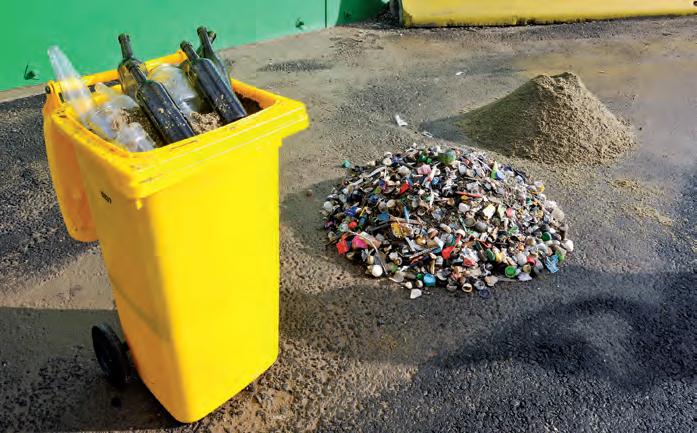GROWING A SUSTAINABLE FOOTPRINT
WITH TONERPLAS
TONERPLAS IS A HIGH-PERFORMANCE ASPHALT ADDITIVE ENGINEERED USING POSTCONSUMER RECYCLED PLASTIC POLYMERS. AFTER NEARLY 10 YEARS IN DEVELOPMENT, BEING TESTED AND TRIALLED ON AUSTRALIAN ROADS, CLOSE THE LOOP IS LOOKING TO INCREASE ITS FOOTPRINT IN THE SECTOR.
I
n recent years, policy changes and examples of innovation have propelled the road construction industry forward, not only to increase the use of its own waste but to be a valuable market for other waste streams. Long before the COAG ban on waste exports or the implementation of Victoria’s Recycled First Policy, Close the Loop, a major take-back provider of ink and toner cartridges, had a zero waste to landfill policy. This prompted the team to investigate markets for waste printer toner, which is a high-grade polymer. A trip to the United States demonstrated to Close the Loop that using these polymers in asphalt could be successful
TonerPlas is made from waste toner powder and post-consumer recycled soft plastics.
44
ROADS NOVEMBER 2020
and even increase performance. When a surveyor studied the roads and returned good results, Close the Loop got to work creating TonerPave. From there the team began the wide search for industry partners to develop the use of this innovative asphalt additive using waste toner powder. Metro Asphalt and Downer answered the call and the first road was laid in 2013. Several years later, post-consumer recycled soft plastics were added via an advanced manufacturing process designed and installed by the team at Close the Loop, and TonerPlas was released. Steve Morriss, Founder of Close the Loop, says ever since the inception of TonerPave
back in 2013, the team have been working on iterations of the technology, trialling different things along the way to improve performance characteristics. “For us, TonerPlas is about more than using a waste material in roads, it’s about using that material to enhance the performance of the asset. Building viable end markets is the key to recycling because you aren’t recycling until someone purchases that recycled product,” he says. As an asphalt additive, TonerPlas is designed to melt and disperse into the bituminous binder and the asphalt mix, which helps to reduce cold temperature cracking, increase rut resistance and lengthen asphalt life. “That road was laid back in 2018 with much support from the council and today the road still looks pristine. Jim Appleby, General Manager of Reconomy at Downer inspected the road recently and saw no faults,” Morriss says. A Victorian Government and Metropolitan Waste and Resource Recovery Group case study found a trial, in which Downer used TonerPlas and a mixture of recycled glass and reclaimed asphalt, showed it improved road fatigue life by 65 per cent, meaning reduced cost of ownership over the lifetime of the asset. “The performance characteristics enhanced by using TonerPlas include increased fatigue resistance and improved stiffness and rut resistance,” Morriss says. In 2020, the product was added to the Infrastructure Sustainability Council of Australia’s iSupply directory for use Australia wide.

















